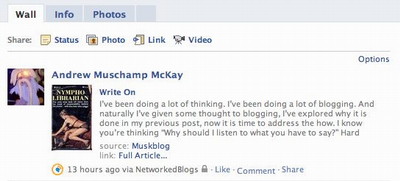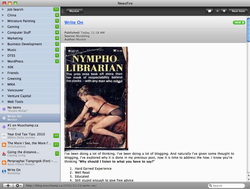Write On
December 21st, 2010
I’ve been doing a lot of thinking. I’ve been doing a lot of blogging. And naturally I’ve given some thought to blogging, I’ve explored why it is done in my previous post, now it is time to address the how. I know you’re thinking “Why should I listen to what you have to say?“
- Hard Earned Experience
- Well Read
- Educated
- Still naive enough to give free advice
I’ve broken my advice and anecdotes into three subsections. The first deals with advice and observations applicable to any writing you’ll ever do anywhere for any reason. The second section deals specifically with adapting to writing for the web and the final section specifically deals with advice for improving your blogging. I’ve included several illuminating quotations as well as some hopefully useful links.
This post is perhaps overly long. That is one of the biggest flaws in my writing.
General Advice
Here are some of William Safire’s “Great Rules of Writing“, if you don’t understand them, the first thing you should do is buy a dictionary and then read some good books, then in a few months return and read his rules again:
Do not put statements in the negative form.
And don’t start sentences with a conjunction.
If you reread your work, you will find on rereading that a
great deal of repetition can be avoided by rereading and editing.
Never use a long word when a diminutive one will do.
Unqualified superlatives are the worst of all.
De-accession euphemisms.
If any word is improper at the end of a sentence, a linking verb is.
Avoid trendy locutions that sound flaky.
Last, but not least, avoid cliches like the plague.
Short Sentences Have Power, that is something I tried to explain to some of my MBA classmates. During my MBA I became something of a go to guy to help people edit papers, business plans, resumes, and cover letters. For a lot of these people English was not their first language and many of my classmates were overly competitive, comparing grades and GMAT scores. I did have one unique GMAT accomplishment, a perfect score on both written compositions. The point I tried to drive home. The point I’m trying to make now. You should vary the length of your sentences. Short sentences break up the flow of the words on the page. They can be used to add emphasis, to shock, to inspire.
Writing a perfect short sentence is just as hard if not harder than writing a perfect long sentence.
There are a lot of theories out there on what constitutes good writing. A lot better authors and thinkers than I, have tackled the subject of Quality and Beauty, two names come to mind when I type those words; Robert Pirsig and Umberto Eco. The Wikipedia seems to agree with me. A lot of the theories developed over the years try to classify, sometimes even quantify, art. A lot of ink has been spilled on this topic from the time man learned to write or at least the Greeks. I personally like Nietzsche’s theory of the Apollonian and the Dionysian and although I think it works best when considering music, a number of writers in the 20th century embraced his ideas. Oscar Wilde flippantly proposed another dichotomy, which upon reflection, mirrors one I personally proposed.
The difference between literature and journalism is that journalism is unreadable and literature is not read.
The biggest thing I think is lacking in most modern writers is craftsmanship. People are always in a hurry, writing entire books in mere months, websites in mere days, and term papers in mere hours. I once read a story about Aldous Huxley I believe, which I think is very illustrative on the difference between people writing today and the people who wrote a century ago or more.
Aldous Huxley typed his novels one page at a time. And each page he attached to the wall of his home. Thus the book could be read from the first page to the end by standing staring at the walls and progressing from wall to wall and from room to room. Aldous would rise in the morning look at a wall, look at a page, take it down and rework it until it was better. He’d then place it back upon the wall and continue reading until he found another page which needed improving. Huxley considered every single page separately and used all his skill and experience to make each single page of the book the best it could be. That is what I mean by craftsmanship.
My final piece of general writing advice it to plan ahead. Some will tell you it is all about inspiration, writing in the moment, and just givin’er. That can work for a while, but eventually you’ll have to write something to spec, or in a certain style, genre, or on a strict time limit. In these cases it can make a huge difference if you plan ahead. For this post I did a lot of thinking while away from my computer. I first came up with a title, then I came up with subsections, then various points I wanted to make and then double checked quotations I wanted to use. I did all this before writing the first paragraph.
I basically write from beginning to end, though I often dart back to previous paragraphs and improve them long before I’m finished the entire piece. I was given some good advice by some of my professors which I try to keep in mind. Before second year university I just sort of winged things and I often wrote in a style that was heavily influence by people like Douglas Adams, Terry Pratchett, and Oscar Wilde. In second year I had to take a course that was hated by most of my classmates, technical writing aka ENGR 240. My teacher was quite frankly great, that course was the single most useful course I’ve taken in my entire education. He taught the craftsmanship of writing, he also introduced me to Kilgore Trout, the professor, the late Michael Cullen.
Writing for the Web
Writing is easy: All you do is sit staring at a blank sheet of paper until drops of blood form on your forehead.
Above is Gene Fowler‘s description of how easy writing can be. If you’ve noticed I’ve used the quotations, headings, and even images to break up the flow of this blog entry. How things render and how they look on the screen is something a writer has to consider when writing online, something the old typewriter generation never had to consider, let alone someone like Milton.
The most important thing to remember when writing for the web, is people don’t read, they scan.
This key insight I learned from Steve Krug and his excellent book “Don’t Make Me Think”. Anyone who has a website or is responsible for the upkeep or construction of websites should read his book. To give you an idea of how good that book is, I think I’ve bought four copies now as mine kept disappearing.
Blogging
The most important words on any webpage appear between the title tags. The title has actually become more important over the years. It is key to search engine optimization, but it is also the first words web surfers will read in Google or in their RSS feed or on Facebook. I’ve wasted many good postings by giving them poorly chosen titles. The contrapositive is also true, a really well chosen title will get a lot of hits even if the the web surfer doesn’t ultimately find the information they are looking for in your post.
After the title the next most important words in your entire post are the opening paragraph. Once again these are among the first words a websurfer sees in Google, in feeds, and on Facebook. Next to a poorly chosen title the quickest way to ensure no one but your close friends will read your blog is to have a poorly written, meandering, off topic opening paragraph. If you don’t believe me scroll back and reread the number one reason you should heed what I say about writing. I’ve written hundreds of blog postings over the half decade+ Muskblog has been online, most of them go unread and deservedly so.
The picture is of the family dog, though officially it is my sister’s dog. Her name is Huuna, she is a chocolate lab plus who knows what. What does the photo have to with blogging? Recently the point has been driven home that a lot of people online are looking for images and one silly, funny, sexy, cute, strange, or shocking image can generate more hits than many thousands of carefully chosen words. Furthermore I think as search engines have gotten more advanced, they’ve realized that real people like images, and I now suspect the exact same post with a chosen image or two will out rank the same post with no images in Google. Just like the most important words you will type in the entire post are the first ones; the title and opening paragraph, the most important image is the first one. This is called the featured image in WordPress. This is the one that will likely appear on Facebook and other similar sites. My recent experimentation has driven home that just a good title, a decent opening sentence or two, and a cleverly chosen photo will get forwarded and liked a lot more than a carefully written and researched post.
What you blog about matters. Some subjects are much more popular than others and there are already many established blogs on every single topic, you’re unlikely to surpass them without a lot of effort. Eric Sim would advise you to tell a personal story with universal application.

Content is still king! Hopefully this post helps you write more quality content which now includes well chosen images. The image files should also be well named. Most of these photos were taken (with permission) from Flickr. Not everyone asks before they use your photos and your bandwidth.
The next thing a blogger has to consider when writing is whitespace and typography. Although it can be overused, I know this accusation has been leveled at me. Nonetheless you should use subheadings, as well as carefully choose which words and phrases you bold and italicize. I still type HTML sometimes. I know that puts me in tiny minority. Regardless whether you know what a strong or em tag is, how you use them matters. As you type and especially before you hit the publish button you need to examine how your post looks in a browser window. Use whatever browser you want, but be aware not all browsers render the same.
Mobile browsers matter more than ever. I’ve found that it helps to let your eyes glaze over as you slowly scroll down. Forget that you wrote it. Forget even that you’re an expert in the English language. What words and phrases do your eyes fall on? The words you bolded, italicized, used in subtitles or link text is where the eye will fall. That’s why I recommend previewing and editing after writing most every paragraph, if you’re serious about becoming a better blogger. Even if a web surfer doesn’t take the time to read your post, they can still get your key message if you use typography and whitespace skillfully.

Links make the world wide web work. They form the basis of Google’s PageRank algorithm. They have value. What you link to matters. The words you choose to use in the link text matter. In addition to rambling, over using typography, I’ve been accused of linking too much. The ideal is no more than one link per paragraph, less actually per post. If you have a lot of links to share the best practice is to put them in a list at the bottom of the post. If there is one link that you absolutely positively want people to click on, make sure it is the first link that appears in the entire post.
While brainstorming on what to blog upon and reflecting on previous posts as 2010 comes to a close, I decided that I would make a renewed commitment to Quality. The other thing I decided might help me and fellow bloggers is a mantra, words to keep repeating as you type and edit. I chose for my mantra:
Economy. Utility. Quality.
Notice I put Economy first. I really need to write shorter, more focused posts. This will be one of the last exceptions as I’m trying to cram 15 years of online self publishing experience, two degrees worth of assigned compositions, and a lifetime of reading experience into one single blog post. Utility is something I’ve taken away from a recently posted article entitled 7 Powerful Ways to Get Your Blog Post Noticed. Quality is the final and most important thing I’ve chosen to focus on going forward in my blogging. One well written post is more valuable and will generate more hits than 100 crappy posts.
The Long Read VS The Listicle
Although this blog post never became popular it is definitely one of the best and most important I’ve written. For a while listicles and clickbait dominated social media. But with the rise of Trumpism, #FakeNews, and bots social media is changing. Also changing is search engine optimization. Lengthier pieces, the so-called “long reads” have become more important. Google’s response has been to emphasize and reward E-A-T: Expertise, Authoritativeness, and Trustworthiness. So if you have thoughts on Quality writing you can leave them below.
This entry was originaly posted on , it was last edited on and is filed under: Advice and tagged: Blogging, Quality, Writing.





Here is more advice on becoming a famous blogger, the catch is you have to be female and it would likely help to be Asian too.
http://www.kenwooi.com/2010/05/famous-female-blogger.html